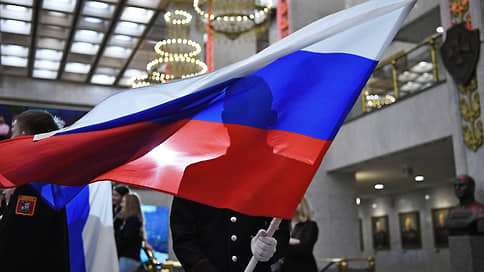Experts stepped into virtual reality – Kommersant
[ad_1]

On the eve of Victory Day, the Expert Institute for Social Research held a round table on Thursday titled “The Battle for History: Historical Memory and Current Politics”. Its participants reported that a real battle for historical truth is now unfolding, which would have been won by Western falsifiers, if not for the work of Russian historians and personally Vladimir Putin. However, this, in their opinion, is not enough, because negative myths about Russia are also spread through video games, and soon virtual reality will become the battlefield for young minds. And in this area, experts also consider it necessary to fight back.
In general, the theses of the discussion were quite predictable. The moderator of the round table, political scientist Pavel Danilin, immediately stated that various negative myths are being created around the history of Russia, which become an instrument of political struggle. “The preservation of historical memory is becoming a task of national importance. No wonder Vladimir Vladimirovich (Putin.— “b”) at a meeting with the Human Rights Council said that the preparation of a history and social science textbook is an important task of national importance. It is not for nothing that Vladimir Vladimirovich himself wrote historical articles, one of which has become a key one in the modern political ideology of the Russian Federation – an article on the historical unity of Russians and Ukrainians, ”added the expert of references that are safe from the point of view of the political situation, after which he moved on to the topic of“ nation-building in a terrifying key.” Naturally, Ukraine became an anti-example in this sense for Mr. Danilin. In particular, he argued with the well-known joke that the ancient Ukrainians dug out the Black Sea, saying that Novorossia at the end of the 18th century was massively populated by immigrants from the territories of modern Moscow and Kaluga regions. “Here it is, the reality of who dug the Black Sea,” the expert summed up.
The political scientist was warmly supported by Alexander Dyukov, a researcher at the Institute of Russian History of the Russian Academy of Sciences. “The writing of the history of Ukraine preceded the emergence of Ukraine as a state and in many respects preceded the formation of the Ukrainian nation,” the historian explained. According to him, after the collapse of the Soviet Union in all countries of the post-Soviet space, under the influence of the West, special “historical and political institutions” appeared that were engaged in the formation of the past and “nation-building”. In parallel, these structures create anti-Russian negativity, which they promote not only within their countries, but also in the international arena, Mr. Dyukov emphasized.
Vladimir Shapovalov, deputy director of the Institute of History and Politics of the Moscow State Pedagogical University, also did not remain indifferent to the “battle for history” and described in detail its main participants. On one side of the front line were the falsifiers of history, who, according to the expert, are engaged in their activities “systemically and comprehensively.” “This is the West, of course,” Mr. Shapovalov explained just in case. “On the other hand, our historical science, our society, the state, which seeks to protect the historical truth, and Russian President Vladimir Vladimirovich Putin plays the leading role in this,” the scientist proclaimed, noting at the same time the importance of writing new history textbooks for the formation of “ objective picture of the past.
Associate Professor of the Department of Russian Politics of the Faculty of Political Science of Moscow State University Sergei Belov turned the discussion in a very unexpected direction. He told how in one of the classes he tried to debunk the myths about the Battle of Stalingrad that are present in the Call of Duty computer game. “The developers demonstrate a lot of negative clichés about the Battle of Stalingrad: detachments, one rifle for three, and so on,” the political scientist explained. After his performance, he was approached by a student who still believed in the game. “I asked him: did you read this in a school textbook, did you watch documentaries, read documents?” Belov shared. The student, as it turned out, did nothing of the sort and in his argument only appealed to “Call of Duty”. “We need examples of games that will preserve respect for veterans, for the exploits of the Soviet people,” the expert concluded.
“In 2003, exactly 20 years old, I came and sent a note to the presidential administration that with the development of the Internet there are video games that young people actively play,” State Duma deputy, political scientist Oleg Matveychev picked up the topic. seize this space with our historical heroes so that we are present there, propagandizing.” However, now this space is already the last battle, and it is necessary to focus not on ordinary video games, but on virtual reality, the deputy warned. “When people will immerse themselves in virtual reality, take part in battles themselves, swing a sword, drop bombs… There are all opportunities for this: simulation of flights on an airplane, participation in the Battle of Borodino, in the Battle of Kulikovo will also be simulated. Everywhere there we should already be present and draw all this, ”he said. Mr. Matveychev acknowledged that these were rather expensive projects, but expressed his conviction that Russia has its own technologies that will make it possible to carry out such developments cheaper than in the West.
[ad_2]
Source link








